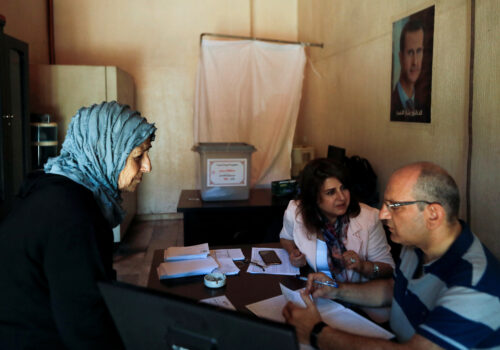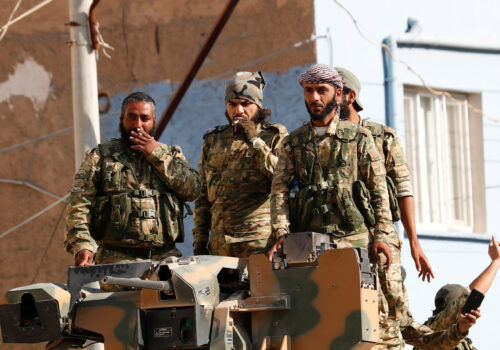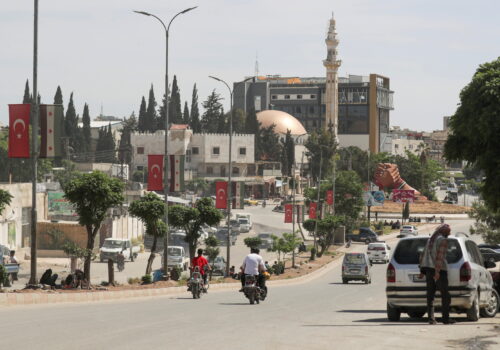Can northeast Syria delink from the PKK?
A decade since the start of armed US intervention in the Syrian crisis, Turkey and the United States remain locked in a disagreement that impedes cooperation on the entire Syria file. Ankara demands that Washington halt its support for its chosen partners in northeast Syria, the Democratic Union Party (PYD) and its armed People’s Defense Units (YPG), both offshoots of the transnational terrorist-designated Kurdistan Workers’ Party (PKK) that has waged an armed campaign against Turkey for more than forty years. However, the two groups represent the leading elements of the US-backed Democratic Autonomous Administration of North and East Syria (DAANES) and its Syrian Democratic Forces (SDF) military units, crucial partners in the campaign against the Islamic State of Iraq and al-Sham (ISIS) in Syria. The stakes are high on both sides: the United States needs effective allies in the northeast to stabilize the area and block an ISIS resurgence, while Turkey must prevent the entrenchment of a PKK-led statelet on its border.
PKK penetration of the DAANES has also created a range of negative consequences for Syrians in the northeast, including relentless Turkish targeting of the area, anti-democratic governance by the PYD, systemic corruption, and armed clashes between the SDF and insurgents in Deir ez-Zor. To create conditions for a wider solution to the Syria crisis and satisfy their own interests, Washington and Ankara must find a mutually agreeable course of action; the two countries are due for a strategic dialogue on Syria later this year, where options can be scrutinized. A perennial idea for solving the impasse calls for the United States to facilitate delinking of the DAANES/SDF and the PKK. However, such a decoupling is easier said than done, and its feasibility hinges on US and Turkish willingness to make tough concessions.
Reign of the PKK
Despite unofficial US government claims to the contrary, the PKK has been intimately tied to the governance and security structures of northeast Syria from its inception. The foundational expertise and personnel that enabled the PYD and YPG to defend, administer, and expand their territorial holdings came from veteran PKK members. Turkish, Iraqi, and Iranian Kurds affiliated with the PKK and its franchises flocked to northeast Syria after the outbreak of the civil war in 2011, forming the core of the area’s administrative and military personnel. PKK veterans assumed greater responsibility as Syria’s security situation deteriorated and new adversaries like ISIS confronted the nascent self-administration. Senior YPG leaders were often Syrian Kurds who had spent time fighting abroad, such as future SDF commander Mazloum Abdi.
SIGN UP FOR THIS WEEK IN THE MIDEAST NEWSLETTER
The network of experienced PKK operatives, or kadros in local parlance, subsequently became the chief conduit for PKK influence in the northeast’s civil and military architecture. While the DAANES has established myriad local political, security, and administrative councils and committees across its territory, power ultimately rests with the kadros assigned to “advise” them; no local authority can overrule the decisions handed down by the often foreign PKK veterans. Key economic functions, such as extracting, transporting, and selling oil from occupied fields in Deir ez-Zor, also fall under the kadros’ purview. Leaders in the DAANES-sponsored local councils have no oversight of the process, creating rampant opportunities for corruption. Smugglers allegedly seek the protection of kadros to protect their operations, and some experts contend that the YPG generates large swaths of its funding from kadros-linked oil diversion.
In the multi-ethnic SDF, kadros are a linchpin of the entire force; they comprise the most experienced fighters and often lead the forces’ non-Kurdish formations. An analysis of YPG casualty figures from 2013 to 2016 showed that nearly half of the militia’s battle deaths were Turkish citizens, demonstrating the importance of foreign fighters on the frontline. During the main phase of operations against ISIS in Syria, units of kadros frequently fought alongside embedded US troops in high-stakes operations, such as in amphibious crossings near Manbij and the liberation of Raqqa. The SDF’s—or, rather, the YPG leadership’s—lack of confidence in Arab partner forces tasked with holding Arab-majority areas like Deir ez-Zor, translated to the appointment of “shadow commander” kadros in these formations as well. PKK leadership reportedly even assigned kadros as minders for SDF commander Abdi.
Kadros are not the only PKK presence in the northeast. The party also works through a proxy known as the Revolutionary Youth (RY), a political organization that conducts civic and military programming but also engages in child recruitment for the PKK. The RY has also been instrumental in the recent PYD-instigated repression of opposing Kurdish political parties operating in the DAANES—a pattern dating back to the earliest days of the civil war in Syria. Offices of the Kurdish National Council (KNC), a Kurdish political alliance closely linked with the Iraq-based Kurdistan Democratic Party (KDP) and opposed to the PKK, are frequent targets of RY-linked arson attacks. In spite of these actions, the SDF and other security elements make no public effort to stymie the RY. In March, the US Department of State delivered a rebuke to SDF leadership over its failures to halt attacks on KNC offices and officials.
Discord in the DAANES
The entrenchment of the PKK has further complicated the already complex dynamics in northeast Syria. Turkey has adopted a more aggressive strategy for countering the PKK in Syria and Iraq, leading to several major military operations, as well as recent assassination and airstrike campaigns targeting DAANES officials, SDF fighters, and civilian infrastructure in the northeast. Non-Kurdish Syrians have their frustrations with the kadros’ rule, as demonstrated by Arab grievances aired during last year’s uprising and ensuing SDF crackdown in DAANES-controlled Deir ez-Zor. The United States is well aware of Turkish concerns and the degree of PKK influence in the northeast, though it has little to show for its efforts to dilute the latter. In spite of years of US-facilitated negotiations between the two Kurdish parties, the PYD continues to obstruct any power-sharing agreement with the KNC.
The situation within the SDF and its civil Syrian Democratic Council counterpart is no less knotted. Insiders and analysts have noted signs of a schism between hardliners and pragmatists within the Kurdish power structures. The former dismisses the idea of delinking from the PKK and eschews any power-sharing settlement with other Kurdish parties; hardliners also allegedly maintain a firm hold on critical political and security functions in the northeast. Meanwhile, pragmatists are open to dialogue and compromise with groups like the KNC; they favor greater international engagement and, perhaps, even breaking with the PKK.
Mazloum Abdi, ostensibly the leader of the pragmatists, claimed in 2020 that the SDF was working to remove foreign kadros from positions of authority and eventually from Syria, stating that “regional Kurdish support” was no longer needed in the DAANES’s extensive network of civic and military bodies. Whether Abdi was unwilling or unable to follow through is an open question, but PKK influence remains just as strong, if not stronger, four years later. Observers on the ground in the northeast have also reported the training of fresh, local Syrian kadros who now operate in areas such as Manbij and Deir ez-Zor, according to speakers in an expert working group attended by the author.
The narrow path to a win-win-win
Beyond its firm grip on power in the area, a complete decoupling of the PKK from northeast Syria also faces obstacles from stakeholders. The PKK has little current incentive to abandon or reduce its presence in Syria while it is losing ground in its traditional refuge in northern Iraq. If claims of oil revenue diversion are correct, hypothesized to constitute 40 percent or more of DAANES oil production, the group also stands to lose a significant fundraising stream connected to the kadros-run extraction operations. The existence of the aforementioned pragmatists might demonstrate some willingness by certain DAANES authorities to delink, but their seeming lack of leverage compared to the more militant hardliners and the lack of incentives from Washington and Ankara dim the prospect of a peaceful transition.
Were the United States and Turkey to agree on the end of direct PKK influence over northeast Syria, a mutually acceptable result would require considerable policy gymnastics from each side. First, Washington must recognize, at least tacitly, that it has empowered the PKK, as refusal to recognize empirical links between the group and the US counter-ISIS campaign in Syria strains credulity and damages mutual trust. Meanwhile, Turkey cannot wish away all the PKK-sympathetic Kurds and others in northeast Syria, even if the party leadership’s grip on the area is broken. A more practical goal for both sides is elevating pragmatist local Syrian elements in the DAANES and SDF and brokering a sustainable peace with Ankara. Reporting on previous US-Turkish compromise attempts indicated that Turkey would accept an opening with the Syrian Kurds in tandem with the expulsion of foreign PKK-linked Kurds, though the path to this might be dubious.
To whatever degree the purging of PKK personnel is operationalized, the effort would presumably create gaps in local administrative, governance, and security capabilities, which would need to be filled. Can the United States contribute to filling such gaps? US policymakers are leaning toward ending the US presence in northeast Syria, and discussions have already occurred on potential exit strategies. However, if an agreement can be reached with Turkey that ejects the PKK from the DAANES, this may incline Washington to invest in its involvement in the northeast to ease the transition from kadros administration to the local bodies already incorporated under the DAANES. Especially critical would be ensuring the competence of security forces tasked with maintaining the fight against ISIS, necessitating closer collaboration between the United States and Turkey.
The odds are slim that the two countries will reach the preconditions and compromises necessary for a delinking deal, let alone smoothly execute it in the face of expected PKK opposition. Still, the strategic logic presents wins for the United States, Turkey, and northeast Syria: Washington eases conflict with Turkey and maintains its Syrian partner, hedged on a commitment of diplomatic energy and finesse rather than new troops or money; Ankara drives a bitter foe from its physical and financial haven on the Syrian border and advances its thaw with Washington; and Syrians in the northeast can take the reins back from foreign militants ruling from the shadows. An agreement on the northeast could also jumpstart wider collaboration on Syria at a critical moment, benefiting millions of Syrians throughout the country still suffering from the fallout of their civil war. With soaring violence and humanitarian needs throughout the country, a burst of joint US-Turkish leadership has the potential to bring the international community back to the table and address the most grievous symptoms of the Syrian crisis.
JP Reppeto is an assistant with the Syria Strategy Project and a former Young Global Professional with the Atlantic Council’s Rafik Hariri Center & Middle East Programs. Follow him on X: @jp_reppeto
Further reading
Thu, Jul 25, 2024
Syrian elections are decided before election day
MENASource By
While the polls were held on July 15, the elections were effectively over at the end of the primaries.
Tue, Jun 18, 2024
From rebel factions to an army: Efforts to tame the Syrian National Army
MENASource By
The ultimate goal of reforming the SNA is to create space for a self-sufficient political actor that organizes public policies.
Mon, Jun 24, 2024
The Syrian electoral system guarantees inequality
MENASource By
The framework of the block vote is so advantageous to the Baath Party that opposition parties would not stand a chance to win a significant number of seats.
Image: A convoy of Kurdish People's Protection Units (YPG) fighters enter the village of Tel Khanzir, after they took control of the area from Islamic State fighters, in the western countryside of Ras al-Ain May 28, 2015. The YPG, supported by U.S.-led air strikes, have been making steady gains this month against Islamic State in the northeast, which is important in the battle against the jihadists due to its location bordering territory held by the group in Iraq. Picture taken May 28, 2015. REUTERS/Rodi Said TPX


